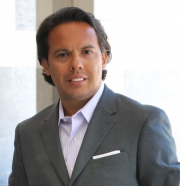For today’s entry in the Friday Five interview series, we catch up with Samuel Rodriguez. Samuel is the public face of Hispanic evangelicals, serving as president of The National Hispanic Christian Leadership Conference. He currently serves on the board of directors of some of America’s leading evangelical organizations such as: Gordon Conwell Theological Seminary, National Association of Evangelicals, Empower 21, and Christianity Today. Rodriguez is also the recipient of the Martin Luther King Jr. Leadership Award presented by the Congress of Racial Equality. We caught up with Samuel Rodriquez and asked him about immigration reform, racial reconciliation, and his new book, The Lamb’s Agenda.
–Daniel
You were the first Latino leader to give a commemorative address at Dr. Martin Luther King’s annual commemorative event. Was that opportunity a dream come true?
Beyond a dream come true, the opportunity graciously rendered serves as a testimony to the purpose and promise of God for each of our lives. When I was 14 years of age, I saw a television special on Dr. King when a still small voice in my heart prompted me to write, “One day, God will enable me to connect with Dr. King’s family as I serve our communities.” With a commitment to holiness and humility, all things are possible.
You’ve said that Dr. King’s vision will only happen through “the Lamb’s agenda.” What do you mean by that?

Simply stated, the Cross is both vertical and horizontal, redemption and relationship, holiness and humility, covenant and community, kingdom and society, righteousness and justice, salvation and transformation, ethos and pathos, John 3:16 and Matthew 25, orthodoxy and orthopraxy , faith and public policy, prayers and activism, sanctification and service, the imago dei and habitus christus, Billy Graham and Dr. Martin Luther King Jr.
Dr. King’s vision will only happen when the followers of Jesus understand that our nation will not be saved via the agenda of the donkey or the elephant but only through the agenda of the Lamb. We need a Christ-centered, Bible-based righteousness movement. One that marries the evangelistic message of Billy Graham with the prophetic activism of Dr. King. Christianity in America will survive the 21st century as a catalytic force for good when we reconcile the message with the march, the Way with the Dream, the call for salvation with a call for justice, and the song of redemption with the song of deliverance. This generation will sing both “There is Room at the Cross” and “We Shall Overcome One Day.”
Hispanics are now the largest minority group in the United States. What do you think are the biggest misconceptions white evangelicals have about Hispanics?
1. We are a monolithic voting bloc.
2. We are all Democrats.
3. We refuse to assimilate or acculturate.
4. We lack economic mobility.
5. We lack an agenda, when the very opposite is true.
6. We lack leadership.
7. We cannot mobilize.
8. We lack a deliverable constituency.
9. We do not value education.
10. We desire amnesty.
Evangelical leaders are now coming around to support comprehensive immigration reform, and many believe there is a great chance of it happing this year. Why should this issue be important to evangelicals?
First, the biblical imperative of Matthew 25, “welcoming the stranger,” the quintessential metric of Christian action, compels us to support immigration reform in a manner that reconciles Leviticus 19, “treating the stranger amongst us as one of our own,” with Romans 13, “respecting the rule of law.” Second, immigrants represent the fastest growing segment of America’s evangelical community. From the Assemblies of God to the Southern Baptist Convention and all points in between, Hispanic evangelicals represent growth, short-term viability, and long-term sustainability for America’s largest denominations. The future of American evangelicalism rests in the hands of the Hispanic born-again community stemming from the immigrant population. We almost deported the future of American evangelical Christianity.
How can local churches best serve immigrants in their communities?
Local churches can best serve immigrants by reaching out with compassionate evangelism, repudiating anti-immigrant rhetoric, and recognizing the imago dei, the image of God, in each and every one of them. In addition, local churches can provide both vertical (evangelistic and discipleship ministry) and horizontal (English acquisition classes) services in a manner that advances the Lamb’s agenda.
Daniel Darling is a pastor, author, and speaker. He regularly blogs here. Follow him on Twitter: @dandarling









